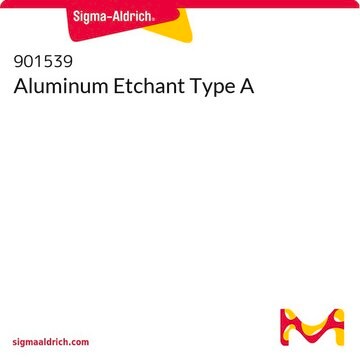GF38294646
Aluminum
mesh, 300x300mm, nominal aperture 0.38mm, wire diameter 0.25mm, 40x40 wires/inch, open area 37%, plain weave mesh
Sinónimos:
Aluminum, AL008710
About This Item
Productos recomendados
form
mesh
autoignition temp.
1400 °F
manufacturer/tradename
Goodfellow 382-946-46
resistivity
2.6548 μΩ-cm
size × nominal aperture × diam.
300x300 mm × 0.38 mm × 0.25
bp
2460 °C (lit.)
mp
660.37 °C (lit.)
density
2.7 g/mL at 25 °C (lit.)
SMILES string
[Al]
InChI
1S/Al
InChI key
XAGFODPZIPBFFR-UHFFFAOYSA-N
Categorías relacionadas
General description
Legal Information
Storage Class
13 - Non Combustible Solids
wgk_germany
WGK 3
flash_point_f
Not applicable
flash_point_c
Not applicable
Elija entre una de las versiones más recientes:
Certificados de análisis (COA)
Lo sentimos, en este momento no disponemos de COAs para este producto en línea.
Si necesita más asistencia, póngase en contacto con Atención al cliente
¿Ya tiene este producto?
Encuentre la documentación para los productos que ha comprado recientemente en la Biblioteca de documentos.
Nuestro equipo de científicos tiene experiencia en todas las áreas de investigación: Ciencias de la vida, Ciencia de los materiales, Síntesis química, Cromatografía, Analítica y muchas otras.
Póngase en contacto con el Servicio técnico



